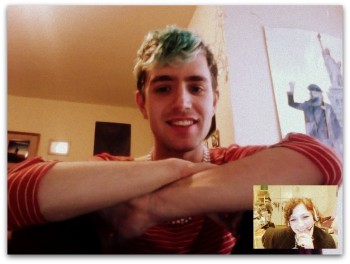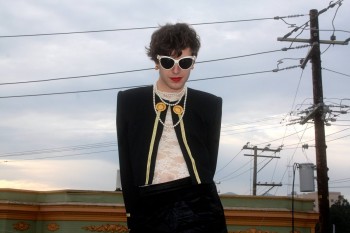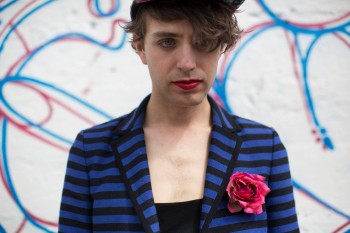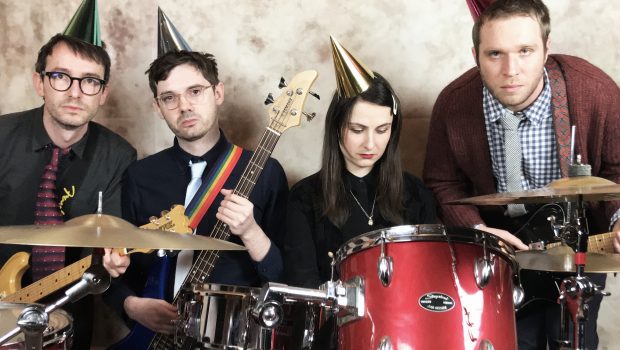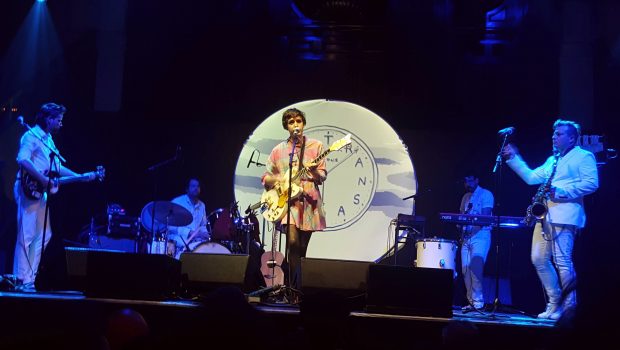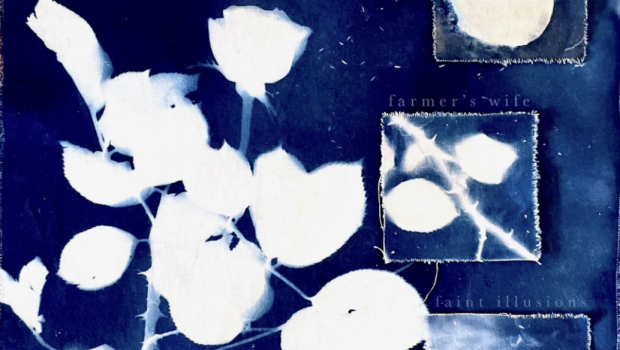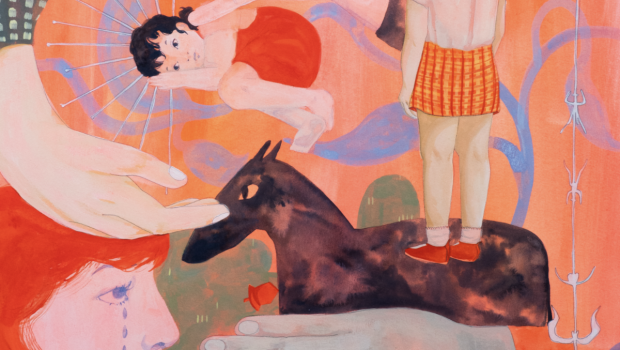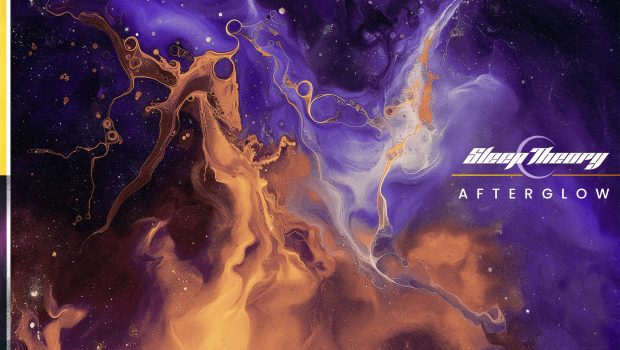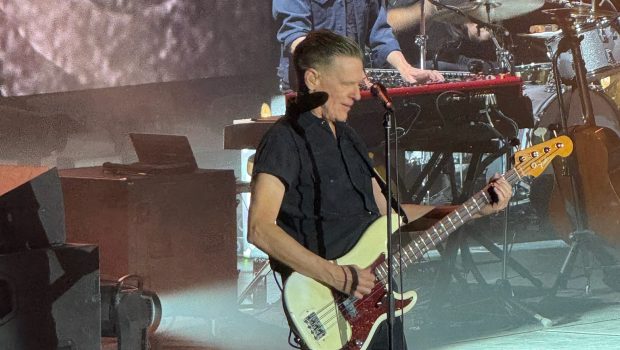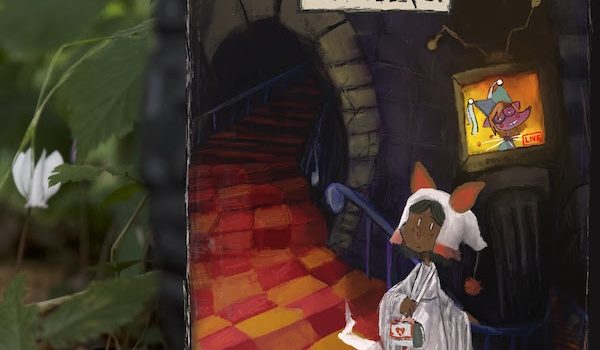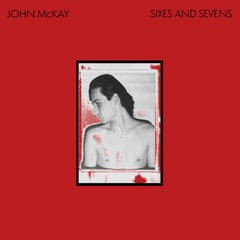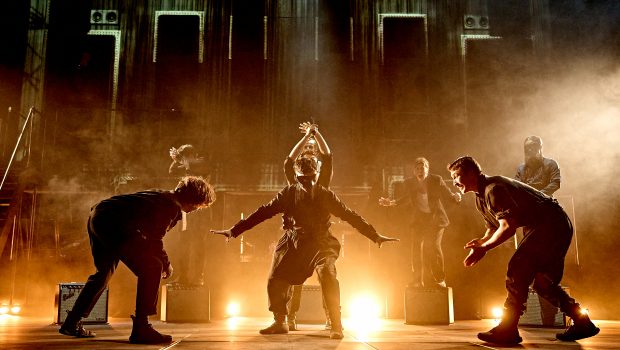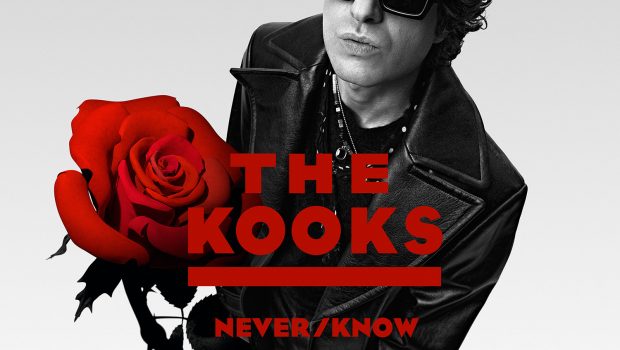Since Ezra Furman’s fame exploded, delighting audiences in Europe and in the USA, the world is a nicer, kinder place. Ezra Furman is not only a fantastic performer, funny and intense: he is also a very intelligent, unique person who writes incredibly well. So, when he agreed to do a Skype interview with me, I felt very happy and privileged. When I called him in California, he appeared in a bright coloured top next to a sunny window, while I spoke from the unglamorous gloom of my English-weathered cave. Now accustomed to the glittering glory of the likes of BBC, Jools Holland, Channel 4 and The Guardian, Ezra is a bit perplexed when he sees my Lumpenproletariat room on his screen. I had thought I should perhaps set up a dazzling background, but then I hoped he’d forgive me for the DIY setting if I wore beads and lipstick. I think the beads worked.
Francesca Nottola: Hello, Ezra! How are you?
Ezra Furman: I’m good, thanks.
FN: How do you feel about the attention around you? Are you happy or are you getting stressed?
EF: I’m getting stressed, but I’m happy. It should be noted that I’m not famous in the United States.
FN: They don’t get you?
EF: I don’t know, there’s a following I guess, but it’s not like in the UK or most of Europe. We just played some shows in the U.S. [in December 2015]. There were some cities where there wasn’t a lot of people. We couldn’t book a show on a Saturday night and we thought ‘We gotta do something!’ and we ended up playing at this cool little community centre just by Facebook-messaging this guy. It’s kind of DIY in the US. We have a very good US booking agent who got us some really good shows, but we also got some for ourselves just by asking people on the internet.
FN: Well, you are everywhere in the music press.
EF: Really? Ok, so maybe I just have to accept that it’s true.
FN: So, is the attention and pressure becoming a burden?
EF: Sure, but honestly it’s getting easier. It used to be that we just had no money at all, trying to play some shows. We’d go around trying to play shows where nobody came and we were like ‘We know this is fucking good, we just know this is really good, and nobody cares!’ That was a lot harder! I mean, there is pressure now and it freaks you out a little bit. For me, what’s really hard is going on tour for a long time like we just did, not having my own space and room to sleep in. It’s a funny thing: you can be famous and kind of close to broke, which is what…we are.
FN: Broke?
EF: Well, not broke, we are making it happen, but we can’t all get our own hotel rooms, for example. We are all trying to save money wherever we can. It’s a bit worrying: we don’t have other jobs, we can’t have other jobs if we are touring this much. If you are asking about pressure, some days yes: you get too much pressure, you get too tired, working too hard, thinking too hard about what people think of you and it makes you go crazy. It’s important to remember, though, that this attention has arisen just by doing whatever I think is cool, and that’s kind of encouraging, because sometimes I’m like ‘Oh, maybe I should do this, maybe I should try to please these people, maybe I should take this opportunity even though it seems uncool…’ I think the reason any of this started was because I was like ‘I’m going to write songs that I think are cool, make a record I think is cool and play shows in the way that I like.’
FN: There are many videos of your performances online. I noticed that you seem to give more importance to your appearance now. Do you think that this increase in the attention you are getting is linked to your choice of expressing yourself more openly through your image and with songs like ‘Body Was Made’ in which you discuss issues of gender?
EF: [Long pause] Yeah, I feel like the two things must be linked. In a few different ways, I came into a new confidence and it was over the course of a few years that I came to a slow realisation that I need to be what I am. I started to become a more whole person, a more honest person and, as I did that, the music got better and then, as the music got better, more people got involved. Honestly, I don’t think gender performance had anything to do with the first good reception I got in the UK with Day of The Dog. I was wearing a dress on the front of that album, but you can’t really see that it’s a dress exactly, and I was sort of…testing the waters someway [smiles]. I felt that confidence in me and I felt that I was going for broke. I thought ‘This is going to be my best album yet, and if it doesn’t happen now, if success doesn’t find me now, I don’t know when it possibly could, because this is the best I can do’.
FN: Which is not true…
EF: Well, that was the best I could do then. It did feel like ‘If this doesn’t work, then I’m just gonna quit. If this doesn’t connect with people and start to make this music career more viable, then I’m gonna quit.’ And then it didn’t really work. I was doing that thing of touring around and not many people coming to most of the shows and I was like ‘Ok, it’s over, I quit. And then I’m gonna have to figure out what I’m gonna do next.’ And then, as I said, it was that show in Manchester [UK] that I was like ‘Maybe I should not quit. This should not be my farewell tour!’ But anyway, it’s true. This gender performance thing…I think I gained some confidence in myself and I realised that doing what I wanna do, being myself, destroying the filter that makes me feel like I’m in hiding was the key both to my personal happiness and gaining a little recognition.
FN: It looks like the verb ‘connect’ that you used, and also ‘authenticity’, are key in making this happen.
EF: Yeah. A lot of people ask me ‘You are being so confessional! You are really talking about your life in your songs. Doesn’t that make you vulnerable? Is that strange to do? What is it, cathartic or what?’ And I think that’s it’s weird. I don’t know. Actually, maybe I just found things in my life to write well about. I would not insist on it, you know? I really like fiction, I like made up stuff and songs that are not autobiographical. In fact, I have a lot of that. I think most of my songs are kind of that. Fictional and confessional. There is a lot of autobiography, now that I think about it. I did lose the will to live in Boston in September, but I really do believe in fiction and I only use my real life when it works and I’ll change it if it doesn’t. I have no commitment to autobiography, I just wanna get the feeling across, and the feeling is what’s real, what’s from my life, you know? The feeling is always the only thing I am committed to communicating. I don’t feel the need to tell my story.
FN: I get you.
EF: Something that’s weird, and it relates to what you said about pressure and attention, is: why do I talk about myself honestly in interviews? Why do I reveal this life information? I guess it’s just because people ask me questions and I don’t lie. I’m not a very good liar or I just tend to answer questions that people ask truthfully. But sometimes I look at artists who never really do many interviews or retain a mystery about themselves and I’m like ‘Man, I should have maybe gone that way!’
FN: There’s no right way of doing it.
EF: Yeah. My story, who I actually am, sometimes seems like…it might be useful for some people to hear. I read a lot of interviews with famous people I don’t know, not a lot, but I’ve read some. I read their biography and the story of their life and it’s been really helpful to me, it’s like ‘That’s a way to be’, it’s helpful to know that there’s lots of different ways to be a person.
FN: What about your musician brother, Jonah, of Krill? They disbanded recently. Did you ever play with him?
EF: We’ve played some shows together. We never really played much music together. We never formed a band or ‘jammed’. We show each other songs sometimes. He’s just musically in a different world than me. He has a very different relationship to music than I do. He’s really experimental and he really does things that are musically interesting.
FN: You also do things that are musically interesting!
EF: Yeah, but I think I’m interesting more on a songwriting level. I mean, I’m not doing music that you feel like the aliens made it, like Jonah is: strange unusual time signatures or chords, bizarre chord structures…
FN: So you are not the Stravinsky of the 21st century?
EF: Jonah is! I mean, I have a little bit of envy of him and his talent. And I’m happy with what I can do, but I just can’t do what he does. I’m really impressed with him. He has influenced me, I’ve learnt things from him. But he’s interested in music in this way. He’s interested in finding things out that can happen musically, whereas I am interested in finding things out about songs, what songs can be. That’s my main interest as a songwriter: what makes a song effective, great, interesting and powerful. Jonah is interested in that too, but he’s also interested in what weird things he can make a bass guitar do. He writes a lot of his songs in this tuning that has four strings and they are only tuned into two notes, something like that. He plays a guitar that’s not like anyone else’s guitar, that’s what I’m saying, it’s tuned in a different way, has a different set of strings and he almost invented his own instrument.
FN: Did you study Literature at university?
EF: Yes, and Philosophy.
FN: I’ve been following you on social media and I know that you wrote a song [‘Ferguson’s Burning’] about the killing of Michael Brown in Ferguson, Missouri. [on 9th August 2014]
EF: Yes.
FN: I really appreciate that you use your presence online to discuss these issues and bring them to people’s attention.
EF: It’s true, but I wrote a song only because I found myself able to make something good, write a good song about it. I have all kinds of political concerns and commitment, but I wouldn’t force anything. That song was not forced out like ‘There needs to be a song about this!’ I’m open to being political, it seems silly not be open to it, and I found myself able to do it in that moment. But it is a choice that I want to be political. I want to be a person who gets political in public. Considering there are all these avenues to say things online, why not? However, I don’t relate to the social media impulse. Unless something is important, useful or interesting. I don’t want to photograph my food!
FN: Thank god!
EF: But then, since I have Facebook, Twitter, YouTube, if I’m feeling really strongly about something, those things are right there and if I can say something about it, I don’t know why you wouldn’t.
FN: Would you say that your audience is diverse?
EF: It’s diverse in some ways. It’s age-diverse, culturally diverse, there’s gender diversity. Perhaps it’s not very much racially diverse. I’m really happy to see people being visibly gender non-conforming at our shows.
FN: Have you got any ideas as to why your audiences are not very much racially diverse?
EF: I think it could be because of the genre we play.
FN: Your music challenges the borders of genre though, and rock’n’roll was created by Afro-American musicians.
EF: Yes, but it just got so ‘whitified’ I guess, it got stolen by white people and black people went: ‘Ok, take it, we are moving on, we’ve got other ideas, bigger ideas!’ And then they made hip hop, for example. A lot of rock’n’roll, especially some retro rock’n’roll that I play, appeals to people worshipping The Beatles, Elvis, The Beach Boys and other people who stole it. It’s also true that: why would you still be playing that when there’s so much amazing stuff going on? I have been listening to Kendrick Lamar‘s album [To Pimp a Butterfly, 2015]. I’m not the biggest hip hop head, but this Kendrick Lamar album is one of the best albums I’ve ever heard. It’s such a powerful piece of art, so sprawling, so ambitious! Right now, I’m into this and also other stuff and sometimes I wonder ‘What am I doing with this old-fashioned band, I want music like this!’ Although, I don’t think I can rap, that’s one issue there. It’s the methods of making hip hop and sampling and the freedom with which it happens that’s got a lot to teach me, I think.
FN: What are the things that make you very happy?
EF That’s broad!
FN: I know, but if you choose it reveals what matters to you.
EF: Yeah, sure. The first thing I thought of was love [smiles], a person that I love, and I’m thinking of a specific person. We need to talk about them! That was the first thing. The second thing that came to mind was Passover.
FN: Interesting!
EF: Jewish holidays, the rituals and practice a lot of the time bring me a happiness that I just can’t describe. Passover is one of my favourite moments in the Jewish calendar, maybe my favourite. Third thing: the song ‘Love and Mercy’ by Brian Wilson. I’ve been addicted to it a little bit, that song in particular, lately. I only heard it on this past tour and I was so into it that there was stuff going on around me and stuff I had to do, like get on the phone about something, we had to get in the car and I was just running away, hiding to listen to it again. I was like ‘I don’t want to do anything except listen to this song one more time!’
FN: I know the feeling.
EF: And I kept thinking it was going to get old, and I still keep thinking I’m going to get tired of hearing it and I just don’t. It has only happened a few times that a song does that thing to me that I actually want to listen to it a hundred times. Even if I love a song, I don’t want to play it again and again. I just listen to it and then listen to something else and come back to it tomorrow, but sometimes…
FN: Do you think emotions are underrated?
EF: I just think that relationships are something sacred actually, and I’m disturbed by people who treat each other callously and casually. Most of all, I’m pro-love I guess, and I take love seriously and I think it has a lot to do with respect. So that makes me a little wary of casual sex. I’m not against casual sex, that’s just not how I operate and it seems weird to me that so many people want to have a lot of sex and throw themselves around in a light way to me, that freaks me out a little bit. I’ve been hurt by this attitude and I just feel kind of fragile with all that stuff, and I think people are more fragile than they let on.
FN: Thank you so much Ezra for chatting with me, it’s been a severe pleasure.
EF: It’s been pleasant to talk to you. See you next time!
The full interview is available here: https://noctulacomms.wordpress.com/2016/02/09/ezra-furman_interview/
Ezra Furman plays at the Ritz in Manchester on Thursday 27 October 2016. (full live dates here)
